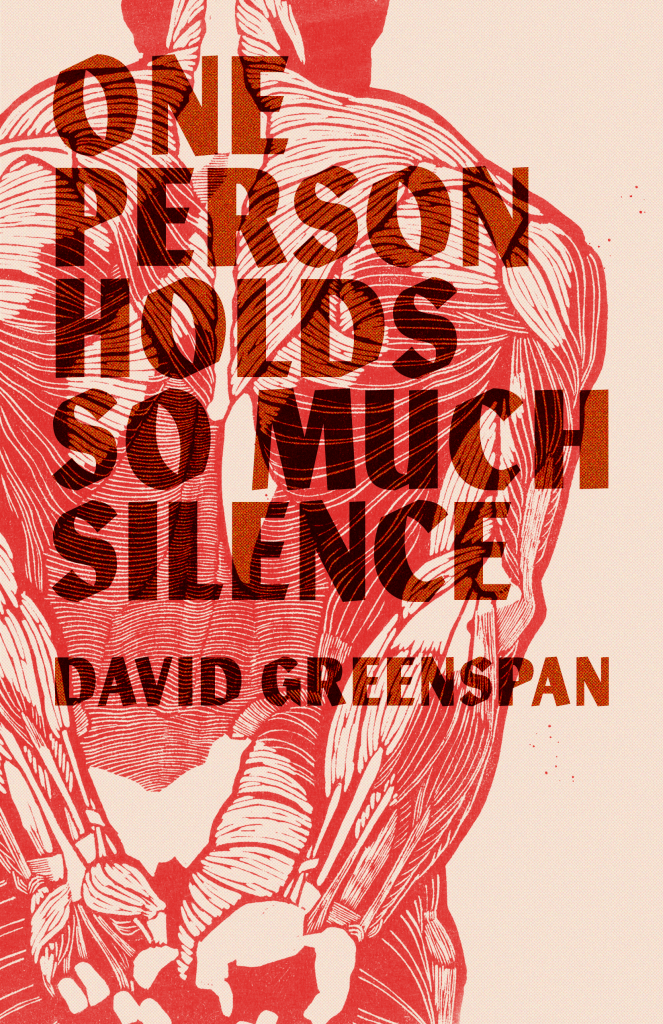
Review by Nikki Ummel
David Greenspan’s debut collection, One Person Holds So Much Silence,explores, at its heart, the relationship between mind and body, and what happens when one- or both- fall apart. The collection opens with, “Poem for a god of my own understanding,” which situates us in the pressing needs of the collection: corporeal existence, mental illness, drug use, and the myriad ways a person can slip through society’s cracks. See how the poem starts with, “Opening my palm on a fence,” and then later, “opening / my knee on a mirror” after “the doctor / sputters up lust small / tablets.” We see the speaker’s body mirror the speaker’s mental health; both are unraveling.
The speakers of these poems struggle: addiction, mental illness, poverty. In “Skinny Fisted Sons,” the rural setting is rife with decay, alcoholism, and other “magnificent ways to die.” We see the ways that poverty kills, causing the “sons” to turn not on society, but on each other. Their life, a cycle of abuse and decay, is eating them alive. Generational trauma is present in “Skinny Fisted Sons” and can be traced throughout the collection. In “Three: The Dead,” the narrator states, “we lived with memory / we have no answers.” In the closing poem, “A Poem to Pass the Time,” the speaker relates a traumatic experience with his father. “He anesthetized our dog / beneath a pignut hickory sky / I was a child / I wanted to be / nothing.” There is no escape; to be alive is to live with memory, to live with memory is to live with trauma.
Greenspan’s collection is concerned with the ways that we, as humans, continue existing despite reason. In “Where are the worms in my mouth brother in your mouth,” the Q speaker, filling the role of therapist or doctor, asks, “How are you doing threaded together so.” Later, A responds, “Beneath my skin is a zipper. Beneath the zipper is more skin. Shapeless, without tuft of muscle, bone, organ.” The body is held together so delicately, paralleling the speaker’s mental health. “I’m sad enough / to put real thought / into how I’d kill myself…but not sad enough to do it” confesses the speaker of “I don’t like to sing about boxing but I hope you’ll understand.” There is no hope to be found in medication, which keeps the speaker “at an acceptable level of sad.” Medication becomes another source of trauma, a way for the speakers of these poems to lose themselves in escape.
Drugs appear and reappear, slipping out of the poems as quickly as they enter. In “Where are the worms in my mouth brother in your mouth,” the speaker bleakly states, “Endless reaches of lithium flavor.” Later, “I was as much as anyone. Grafted and grifted the first time she found needles. Slouching toward death, both of us.” In “Poem for Florida,” the speaker mentions “lemon bright distraction,” then, “Pills and pills.” “Palliative on Rooftop” is about a group of friends hanging out “with clonidine and gabapentin / prescribed off label.” Within these drugs is not liberation or relief, but instead, “overdoses and tumors,” the slow slide towards death. “Unspool with us,” states the speaker of “Body by Adderall.” The process of slipping through the cracks becomes communal.
This book is a coming to terms: with mental health, addiction, place, personal history. The failings and wailings of the body. The collection closes with “A Poem to Pass the Time” which poses Greenspan’s response to his traumas. “Here’s what I have… culpability of language/ a rush of pencil on paper,” and despite the claim that “the poem isn’t very kind,” there is relief in the process of creation. “I can’t understand anything / unless it’s wet with metaphor.” Poetry becomes the act of meaning-making, and in meaning, there is the shimmer of hope.
Nikki Ummel is a queer writer, editor, and educator at the University of New Orleans. Nikki has been published or is forthcoming in Painted Bride Quarterly, The Adroit, Hobart, The Georgia Review, and more. In 2021 she was nominated for a Pushcart Prize in Poetry and awarded an Academy of American Poets Award. She is currently the Associate Poetry Editor for Bayou Magazine. You can find her on the web at www.nikkiummel.com.
![[PANK]](https://pankmagazine.com/wp-content/themes/pank/assets/images/pank-logo-large.png)
